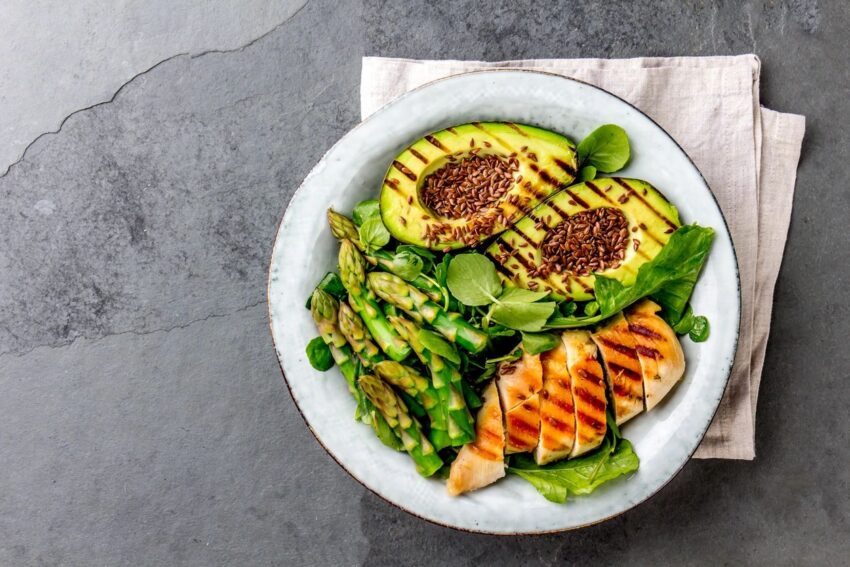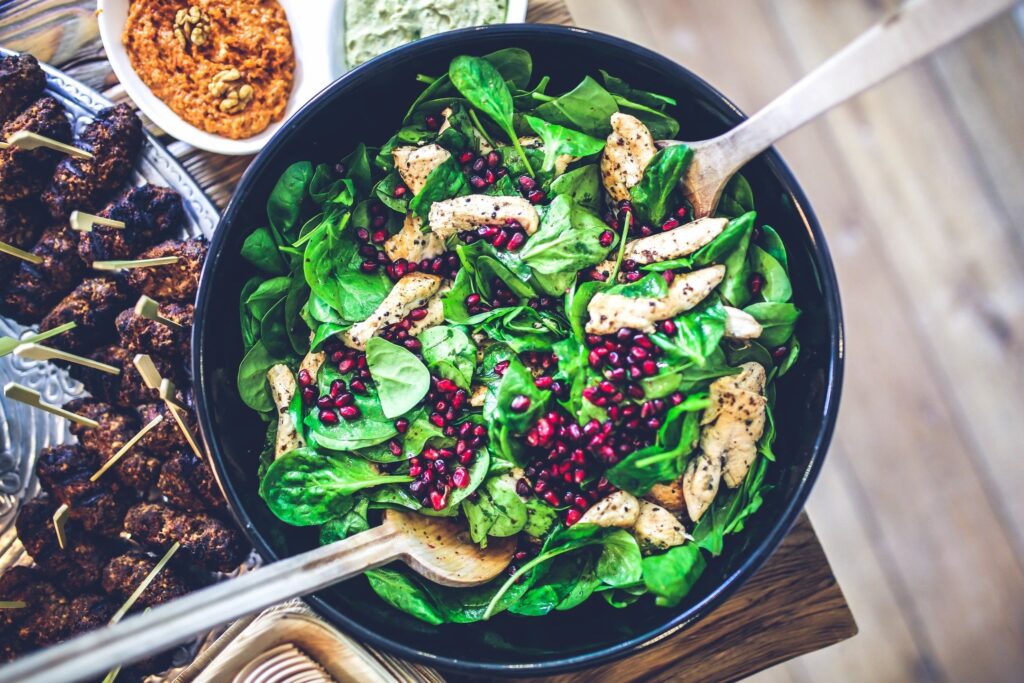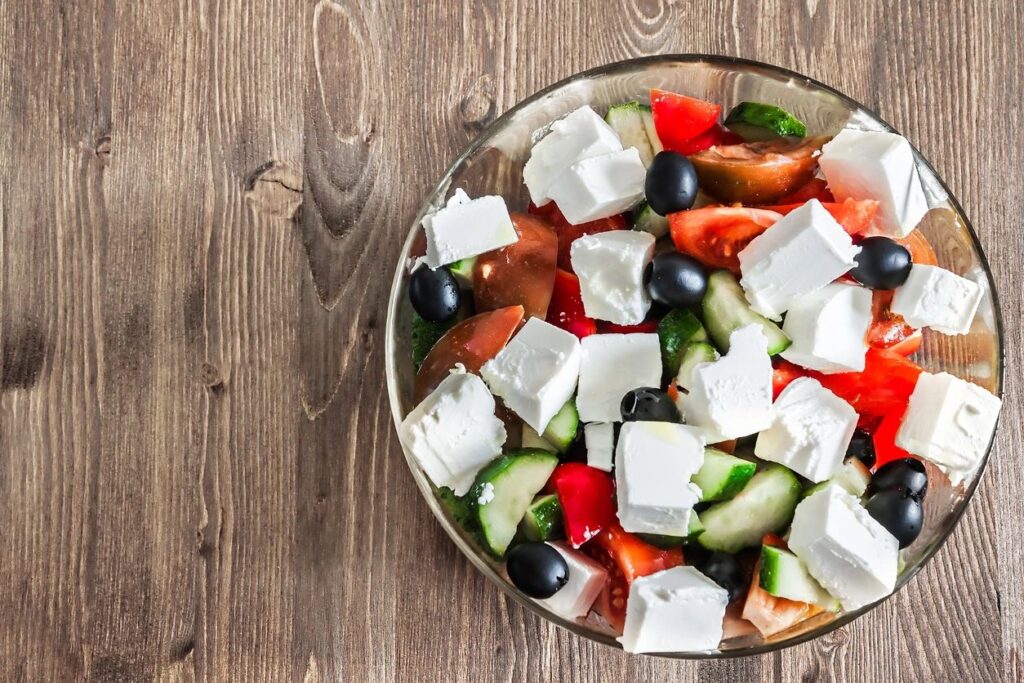Why Are Balanced Meals Important?

In this post, I cover why it’s important to eat balanced meals. For how to make balanced meals, check out my previous post: how to make balanced meals.
Balanced meals pair protein, healthy fats, and fiber. Not only is this combination ultimately satisfying and satiating, but it can have some real implications for our overall health.
First, let’s address the hunger piece.
Hunger
Eating balanced meals is one of the number one ways we can prevent getting a) hungry too frequently, and b) still feeling hungry following a meal. This is due to the types of foods included in balanced meals, and the combination of fiber, protein, and healthy fats. Let’s break it down.
Fiber
Fiber is a type of carbohydrate that the body does not actually have enzymes to break down and it is a complex structure, therefore it is slow to digest itself and slows down the digestion of other food eaten along with it. This includes the slightly faster digesting starch, and fast-digesting sugar, which are the two other types of carbohydrates.
Most whole food carbohydrates (fruits, vegetables, beans, legumes, whole grains) contain all three types of carbs in varying amounts.
For example, apples contain mostly sugar and fiber, whereas oats contain mostly starch and fiber, but also some sugars.
We need the fiber in these foods to slow the digestion and absorption of the starch and sugar. If we were to only drink apple juice (the sugar from apples), we would be left feeling pretty hungry, right?
Additionally, whole foods with fiber are typically higher in volume due to water content. When our stomachs physically fill up with higher volume foods, the stretching actually sends the signal to our brain to produce satiety (fullness) hormones to let us know we are no longer hungry.
This is why it would be very difficult to eat five whole apples in one sitting, but easy to down a huge glass of juice. Apples are high volume and we feel naturally full.
Protein
Protein takes a long time to break down and activates the release of satiety hormones, which keeps us fuller for longer.
Healthy Fats
Fats also take a long time to digest and activate satiety hormones.
The combination
The combination of all three is important because if we JUST ate fiber, we would feel physically full and might stay fuller longer than if we ate sugar (apple vs. apple juice), but we’d still end up hungry. This is why we don’t want to eat just fruits and vegetables. We’d never feel totally satisfied.
If we just ate protein or fat, we’d feel like we were missing some volume, and we’d be likely to eat more than necessary. For example, nuts are a great source of healthy fats, but it can be easier to overeat them because they are not high in volume.
Fiber/higher volume foods tend to fill us up physically, while protein and fats keep us full.
For example, a giant salad would fill us up, but adding some protein like chicken, shrimp, or tempeh and healthy fats like dressing or avocado will keep us full.
Or, pairing an apple and nuts together is way more satisfying than either on their own. Adding in another rich source of protein like Greek yogurt or an egg makes this snack even more filling.
Essentially, the combination of all three is imperative for feeling more full and satisfied, and therefore less hungry both following a meal and between meals.

Cravings
Cravings get a bad reputation, but I don’t really view them as a bad thing. They’re more like a signal or message as to what our body needs. Our body’s often crave something when they need something.
For example, I find that those who eat a very low carb diet often crave sugar. This is not the body trying to derail your efforts to lose weight, it is simply calling out for what it needs to thrive.
The same is true for women when we get a period. We often crave iron and magnesium-rich foods like chocolate, greens, beans, and/or red meat. We may even crave more sweets and breads because our blood sugar actually drops.
Various cravings can tell us so much information about our true needs, largely in relation to specific nutrients. When we get adequate nutrients though, like sufficient carbs, protein, and fats that come along with vitamins and minerals (a.k.a. balanced meals), we have fewer cravings. Our body is getting a wider range of nutrients and it is getting enough of them.
If we only ate bread, for example, we might be in heaven for a minute, but then we’d begin craving not just protein and fat, but likely fruits and vegetables too since we were missing out on so many different nutrients!
Energy & blood sugar
Balanced meals are incredibly important for even energy and blood sugar during the day! If you’re constantly feeling like you need something sweet or starchy, or even caffeine, as a “pick me up” during the day, pay attention to this!
When we eat carbohydrates, they eventually get broken down into their smallest form known as glucose. Glucose is absorbed into the bloodstream where it causes our blood sugar to rise. Insulin is a hormone produced by the pancreas that gets glucose into the cells and out of the blood stream, bringing our blood sugar back to baseline and providing our bodies with energy (we can only use glucose if it’s in our cells).
When we eat carbohydrates on their own, such as a piece of toast or fruit with nothing else with it, we get an influx of glucose more rapidly and all at once because there isn’t much slowing down the absorption. We get all of that energy immediately and then it’s gone.
Sometimes, if the spike in blood sugar is too high, our body will overshoot and produce too much insulin, which can then result in our blood sugar falling too low. This causes feelings of low blood sugar like irritability, “hanger”, shakiness, lightheadedness, etc. Our body sends the message: “I need sugar NOW!” to bring our blood sugar back up.
So, we eat something sugary or starchy, get another high rise in blood sugar, starting the process all over again.
Every time our blood sugar drops, we also get a drop in energy and feel the need to eat something/eat something with sugar or starch to bring our energy back up. Inevitably, we end up riding a blood sugar and energy roller coaster all day, constantly feeling energized, but then tired and hangry.
Weight
When this blood sugar rollercoaster happens, we are constantly relying on the consumption of sugar for fuel, and we are producing insulin too often. Insulin is a storage hormone (that also does lot of other important things in the body), so when insulin is around, we are storing sugar, not necessarily focusing on burning stored fuel. When insulin is not present, a different hormone, glucagon, is produced that burns stored fuel for energy, aiding weight loss. This is what happens between meals and overnight when blood sugar is stable and we aren’t eating.
So, in essence, when we eat balanced meals, our blood sugar is stable, and we are in a better position for not only weight loss, but fat loss, which is what most of us actually mean when we say we want to lose weight. Plus, we are also less hungry, and eating fewer calories in general. We do need to be in a calorie deficit to lose weight, but hormones, like insulin and glucagon, matter too.
I don’t want to give insulin a bad rep because it really is necessary. For example, we also need insulin in order to get carbs into our muscles to not only be used for energy, but if we want muscle growth. We also need it to convert inactive thyroid hormone to the active version, which fuels our whole metabolism and affects most organ functions.
I say this because sometimes (like in the keto community) it can seem like if we just don’t eat carbs, we won’t produce insulin, then we’ll be in fat burning mode all the time and lose weight. The body is just a lot more complex than that. Additionally, we actually burn fat better in the flame of carbohydrates. To get into that, though, would be deep dive into biochemistry, which we simply don’t have the space for in today’s post! Another time.

Inflammation, acne, hormone balance, & fertility
The issue is not with insulin production itself. This is a normal, necessary process. The issue lies with consistently high blood sugars and TOO MUCH insulin production.
If we are eating either a) an increased amount of high glycemic foods, especially not balanced with sufficient fat and protein, or eating them too often, we have a higher blood sugar and, therefore, increased insulin production.
Inflammation
Increased blood sugars, and thus insulin, can lead to inflammation, which has been associated with nearly every disease including heart disease, diabetes, autoimmune diseases, cancer, and obesity. It is also associated with acne, fertility, and hormone imbalance.
Acne
Inflammation from excess insulin can potentially contribute to acne development, but insulin can also increase activity of androgen hormones and increase insulin-like growth factor 1 (a hormone), which can cause skin cells to grow more rapidly and produce excess sebum. Excess sebum is what can clog pores and cause acne to develop. Read more here.
Hormone balance & fertility
Insulin is very similar to ovarian hormones that help eggs mature. If there is too much insulin, the ovaries can confuse insulin with it’s own growth hormones and produce fewer reproductive hormones, possibly interfering with egg maturation and ovulation.
Consistently elevated insulin levels (like with insulin resistance) can cause ovarian tissue cells to make excess testosterone, which can lead to the facial hair growth, hair loss, and acne associated with polycystic ovarian syndrome. Read more about this here.
Anxiety & mood
When blood sugar drops, the body releases epinephrine (adrenaline) to help bring blood sugar back up to normal (1,2). This causes symptoms associated with low blood sugar, including:
- Irritability, aggression, impatience
- anxiety
- nervousness
- difficulty concentrating
- hunger/”hanger”
- personality changes
- heart palpitations
- sweating
- loss of consciousness
You know the Snickers® commercial? “You’re not you when you’re hungry”? What’s happening here is low blood sugar. When a person eats something sugary (like a candy bar), they feel better and feel like themselves again. This is because the sugar in the food allowed their blood sugar to come back up.
Even those without diabetes (or poor blood sugar control) can experience low blood sugar symptoms, largely related to two reasons:
- Not enough available glucose. Glucose is the sugar our body uses for energy and brain function. If we are eating a diet that is too low in carbohydrates, our body won’t have enough available, and we can become more irritable, cranky, depressed, and/or anxious more often.
- Imbalanced meals. When we eat too many carbohydrates, especially refined carbohydrates like candy and white bread without anything to balance them out like fiber, fat, and/or protein, we get a large influx of glucose all at once. This can cause insulin, the hormone that gets glucose into the cell and out of the bloodstream, to overshoot, resulting in a low blood sugar, and thus symptoms of low blood sugar.
When we eat a sufficient amount of nutrients in balanced meals, we are much less likely to experience these symptoms. Additionally, simply lacking certain nutrients like protein, healthy fats, vitamins, or minerals can also contribute to anxiety and mood changes. For example, we need certain amino acids, which we get from protein-rich foods, to create neurotransmitters responsible for brain health and function.
So, when we eat balanced meals, not only are we balancing our blood sugar, we are also getting a wider range of nutrients necessary for overall health and function of the brain and body.
Conclusion
Essentially, when we eat balanced meals, not only do we FEEL better because we have steady energy, hunger levels, and mood throughout the day, but we also improve our overall health by limiting risk of inflammation, anxiety symptoms, acne, and hormone imbalance. Weight loss becomes easier, we have less cravings, and we are ultimately nourishing ourselves with adequate nutrients.
For more help creating balanced meals and figuring out your personal needs, apply for nutrition coaching.
Sources
- Aucoin, Monique; Bhardwaj, Sukriti. Generalized Anxiety Disorder and Hypoglycemia Symptoms Improved with Diet Modification. Case Rep. Psychiatry.2016; 2016: 7165425. Accessed January 12, 2023. https://www.ncbi.nlm.nih.gov/pmc/articles/PMC4963565/
- Hypoglycemia (Low Blood Glucose). American Diabetes Association. Accessed January 12, 2023. https://diabetes.org/healthy-living/medication-treatments/blood-glucose-testing-and-control/hypoglycemia#:~:text=A%20low%20blood%20glucose%20level,sweating%2C%20tingling%2C%20and%20anxiety.




Leave a Reply